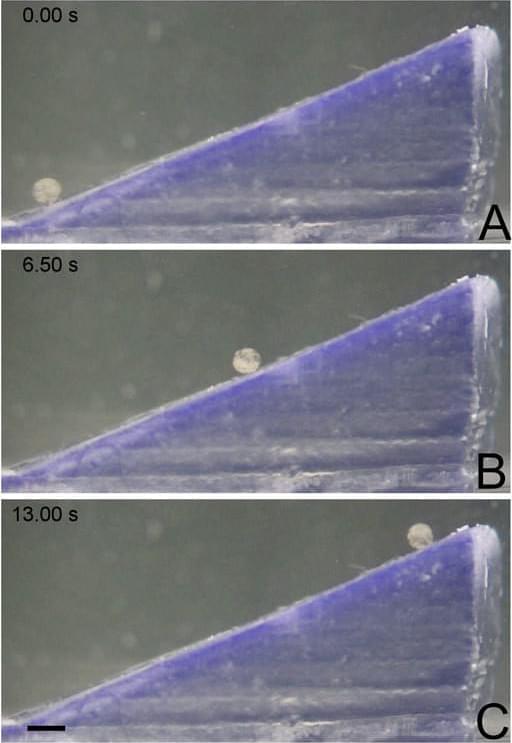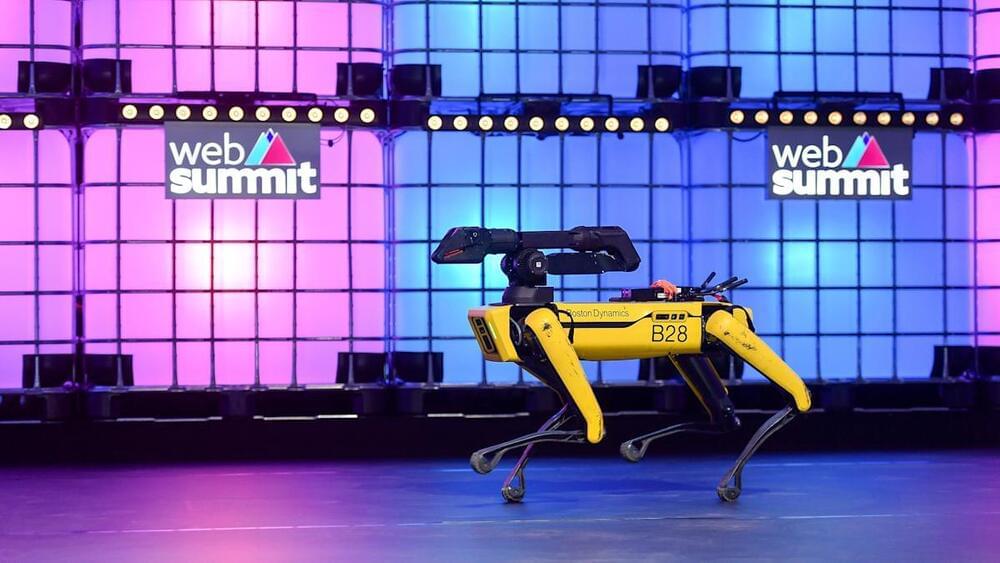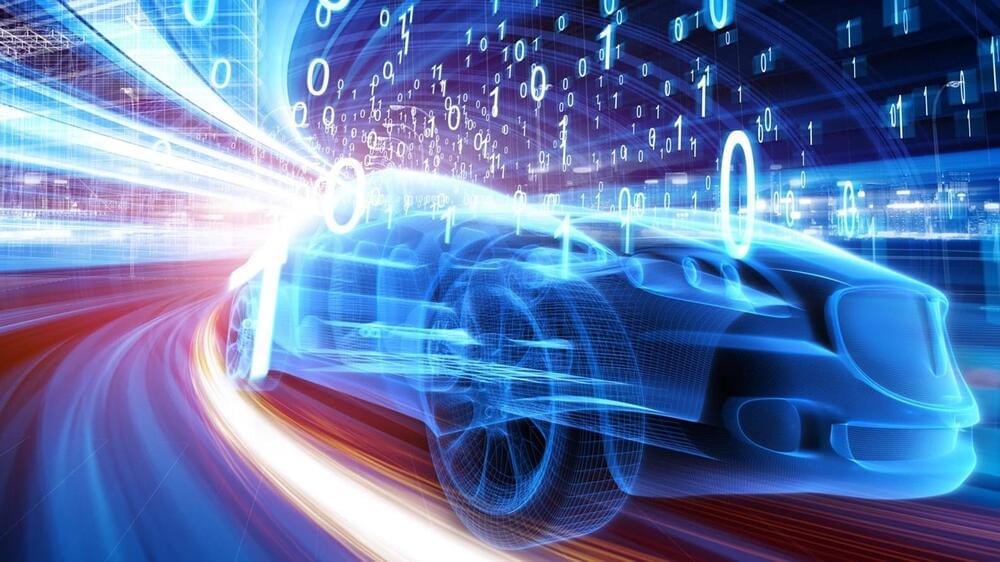This automated robotic mower is truly first of its kind.
Category: robotics/AI – Page 1,931

Tesla and Apple Are a Clear Match, But Their Products Oddly Don’t Work Well Together
Apple and Tesla have a lot in common, but there’s much to be desired — oddly enough — when it comes to how their products work together.
Apple Inc. and Tesla Inc. have a lot in common, but there’s much to be desired — oddly enough — when it comes to how their products work together.
Both companies are known for design, advanced technology and a controlling approach to their ecosystems. Tesla’s cars use a giant iPad-like screen instead of physical controls, and customers can use a smartphone as their key. It’s also steadily moving toward autonomous driving. That’s led people to call Tesla the Apple of carmakers. Elon Musk even tried to sell Tesla to Apple, and consumers frequently say that a Tesla is an “iPhone on wheels.”
But for Apple users, the experience of owning a Tesla can be frustrating.

Emergent Bioanalogous Properties of Blockchain-based Distributed Systems
A more general definition of entropy was proposed by Boltzmann (1877) as S = k ln W, where k is Boltzmann’s constant, and W is the number of possible states of a system, in the units J⋅K−1, tying entropy to statistical mechanics. Szilard (1929) suggested that entropy is fundamentally a measure of the information content of a system. Shannon (1948) defined informational entropy as \(S=-\sum_{i}{p}_{i}{log}_{b}{p}_{i}\) where pi is the probability of finding message number i in the defined message space, and b is the base of the logarithm used (typically 2 resulting in units of bits). Landauer (1961) proposed that informational entropy is interconvertible with thermodynamic entropy such that for a computational operation in which 1 bit of information is erased, the amount of thermodynamic entropy generated is at least k ln 2. This prediction has been recently experimentally verified in several independent studies (Bérut et al. 2012; Jun et al. 2014; Hong et al. 2016; Gaudenzi et al. 2018).
The equivalency of thermodynamic and informational entropy suggests that critical points of instability and subsequent self-organization observed in thermodynamic systems may be observable in computational systems as well. Indeed, this agrees with observations in cellular automata (e.g., Langton 1986; 1990) and neural networks (e.g., Wang et al. 1990; Inoue and Kashima 1994), which self-organize to maximize informational entropy production (e.g., Solé and Miramontes 1995). The source of additional information used for self-organization has been identified as bifurcation and deterministic chaos (Langton 1990; Inoue and Kashima 1994; Solé and Miramontes 1995; Bahi et al. 2012) as defined by Devaney (1986). This may provide an explanation for the phenomenon termed emergence, known since classical antiquity (Aristotle, c. 330 BCE) but lacking a satisfactory explanation (refer to Appendix A for discussion on deterministic chaos, and Appendix B for discussion on emergence). It is also in full agreement with extensive observations of deterministic chaos in chemical (e.g., Nicolis 1990; Györgyi and Field 1992), physical (e.g., Maurer and Libchaber 1979; Mandelbrot 1983; Shaw 1984; Barnsley et al. 1988) and biological (e.g., May 1975; Chay et al. 1995; Jia et al. 2012) dissipative structures and systems.
This theoretical framework establishes a deep fundamental connection between cyberneticFootnote 1 and biological systems, and implicitly predicts that as more work is put into cybernetic systems composed of hierarchical dissipative structures, their complexity increases, allowing for more possibilities of coupled feedback and emergence at increasingly higher levels. Such high-level self-organization is routinely exploited in machine learning, where artificial neural networks (ANNs) self-organize in response to inputs from the environment similarly to neurons in the brain (e.g., Lake et al. 2017; Fong et al. 2018). The recent development of a highly organized (low entropy) immutable information carrier, in conjunction with ANN-based artificial intelligence (AI) and distributed computing systems, presents new possibilities for self-organization and emergence.

Tiny robots could deliver drugs directly to our central nervous system
The robots can tumble up slopes.
A new study investigates tiny tumbling soft robots that can be controlled using rotating magnetic fields. The technology could be useful for delivering drugs to the nervous system. In this latest study, researchers put the robots through their paces and showed that they can climb slopes, tumble upstream against fluid flow and deliver substances at precise locations to neural tissue.
Would you let a tiny MANiAC travel around your nervous system to treat you with drugs? You may be inclined to say no, but in the future, “magnetically aligned nanorods in alginate capsules” (MANiACs) may be part of an advanced arsenal of drug delivery technologies at doctors’ disposal. A recent study in Frontiers in Robotics and AI is the first to investigate how such tiny robots might perform as drug delivery vehicles in neural tissue. The study finds that when controlled using a magnetic field, the tiny tumbling soft robots can move against fluid flow, climb slopes and move about neural tissues, such as the spinal cord, and deposit substances at precise locations.
Diseases in the central nervous system can be difficult to treat. “Delivering drugs orally or intravenously, for example, to target cancers or neurologic diseases, may affect regions of the body and nervous system that are unrelated to the disease,” explained Lamar Mair of Weinberg Medical Physics, a medical device company based in the US and an industrial partner on the study. “Targeted drug delivery may lead to improved efficacy and reduced side-effects due to lower off-target dosing.”

Forget Wheels, NASA Seeks Alternative Rover Motion Techniques for Exploring Robots
In 2,022 university students’ robotics designs may hop, slither, crawl, balloon, tumble, levitate, or leap to victory, displaying alternative rover motion techniques during NASA
Established in 1,958 the National Aeronautics and Space Administration (NASA) is an independent agency of the United States Federal Government that succeeded the National Advisory Committee for Aeronautics (NACA). It is responsible for the civilian space program, as well as aeronautics and aerospace research. It’s vision is “To discover and expand knowledge for the benefit of humanity.”


New AI Algorithm Improves Brain Stimulation Devices to Treat Disease
Summary: Novel AI technology allows researchers to understand which brain regions directly interact with each other, which helps guide the placement of electrodes for DBS to treat neurological diseases.
Source: Mayo Clinic.
For millions of people with epilepsy and movement disorders such as Parkinson’s disease, electrical stimulation of the brain already is widening treatment possibilities. In the future, electrical stimulation may help people with psychiatric illness and direct brain injuries, such as stroke.

Sending robots to space is the ‘first step’ to bringing AI to everday life: Group Leader and Technologist at NASA JPL and Caltech
Ali Agha, Caltech Project Lead, JPL Nebula Autonomy and AI, NASA Jet Propulsion Laboratory, talks testing Boston Dynamics’ Spot AI robot for Mars mission.
Video Transcript
- Welcome back to Yahoo Finance Live. Deeper space exploration missions come with their own set of challenges. Not only are instruments farther away, which make the delay in reacting to certain things difficult, but tricky terrain on the Martian surface has made wheel travel less ideal, as well. And that has researchers turning the Boston Dynamics dog-like robot— you may remember that one from a lot of viral videos— SPOT, as it’s called, for potential solutions.

Robotic waiter learning to serve drinks
Raspberry Pi Zero powers this robotic waiter arm and successfully drops a straw straight into a drinks glass!